Where Is Justice?
I have been in two minds about whether to comment on the debate about the decriminalization of late term abortion as the legislation has already been passed by the lower house and seems set to pass through the upper house as well. I don’t always agree with decisions of our parliament but I accept that, in a democratic society, the will of the majority should prevail and that our chance to express our opinion comes at election time. However, in this case the cost of waiting is too high. This is a complex issue and, as I don’t have the space to comment on all the issues involved, I will concentrate on just one - justice. God repeatedly calls on people to maintain justice. God said, “I want to see a mighty flood of justice, an endless river of righteous living” (Amos 5:24). In the Psalms we read, “Turn from evil and do good… For the Lord loves justice…” (Psalm 37:27-28).
In this case, justice requires that the rights of two parties, the mother and the child, be respected and balanced. Having read this legislation, I believe it fails to do this. I am not opposed to decriminalization. But this piece of legislation is entirely about the rights of the woman and has the effect of entrenching an imbalance of power in law. To my way of thinking, we are addressing one problem by creating another. A woman can fight to ensure her rights protected. A child cannot. It is incumbent on a just society to ensure that the voices of those who cannot speak for themselves are heard. Someone needs to speak for them. As a society we have done this when it comes to abused children in institutional care. We are doing so when it comes to domestic violence. We are starting to do this when it comes to the care of the elderly in nursing homes. But in the case of the unborn child, we are moving in the opposite direction and entrenching injustice. I don’t deny that there is a broad spectrum of opinion about whether an unborn child has rights, or indeed at what point they should be considered a human being and those rights should apply. The arguments are medical, philosophical, ethical, and religious, and the answers range from conception, to birth, and every point in between. But at the very least, if a child is sufficiently developed to survive outside of the womb, I struggle to see how it cannot be regarded as a living human being or how a just society could allow someone to end its life.
Neil Percival
In this case, justice requires that the rights of two parties, the mother and the child, be respected and balanced. Having read this legislation, I believe it fails to do this. I am not opposed to decriminalization. But this piece of legislation is entirely about the rights of the woman and has the effect of entrenching an imbalance of power in law. To my way of thinking, we are addressing one problem by creating another. A woman can fight to ensure her rights protected. A child cannot. It is incumbent on a just society to ensure that the voices of those who cannot speak for themselves are heard. Someone needs to speak for them. As a society we have done this when it comes to abused children in institutional care. We are doing so when it comes to domestic violence. We are starting to do this when it comes to the care of the elderly in nursing homes. But in the case of the unborn child, we are moving in the opposite direction and entrenching injustice. I don’t deny that there is a broad spectrum of opinion about whether an unborn child has rights, or indeed at what point they should be considered a human being and those rights should apply. The arguments are medical, philosophical, ethical, and religious, and the answers range from conception, to birth, and every point in between. But at the very least, if a child is sufficiently developed to survive outside of the womb, I struggle to see how it cannot be regarded as a living human being or how a just society could allow someone to end its life.
Neil Percival
